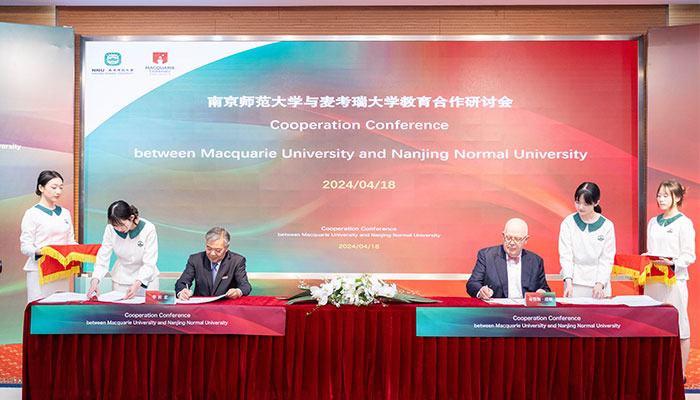Robert Reynolds is an Associate Professor in the Department of Modern History, Politics and International Relations (MHPIR) at Macquarie University. His research focuses on post-World War 2 Australian history with a particular emphasis upon identity politics and sexuality. Dr Shirleene Robinson is a Vice Chancellor Innovation Fellow also based in MHPIR. Her current research focuses on lesbian and gay history, the history of volunteering during the AIDS epidemic in Australia, and the position of LGBTI people in the Australian Armed Forces. She is a Chief Investigator on two Australian Research Council (ARC) Discovery Projects to commence in 2016.
One of their current research projects funded by the Australian Research Council (ARC) is titled: Australian Lesbian and Gay Life Stories which uses oral history to investigate the way lesbian and gay individuals have negotiated social change in Australia.
To gain more insight into their research, we asked Professor Reynolds and Dr Robinson a few questions.
There has been a remarkable shift in social attitudes towards homosexuality in recent years. The current debate about marriage equality is the most obvious marker. Our current Linkage Project with the National Library of Australia and three Australian universities has collected the life histories of 60 lesbians and gay men of all ages from around the nation. They have been deposited in the Oral History Section of the National Library of Australia and with the proper permission can be accessed on-line.
We were really fascinated to find out how lesbian and gay life had changed over time, and how at the level of the individual, rapid social change is experienced. As far as the benefits the research provides to the community, it throws a light on the stories of ordinary Australians who have lived through a profound set of changes in social attitudes. It is not so long ago that homosexuality was deemed criminal, perverted and/or sick.
We have just completed the final interview, a young man in the western suburbs of Melbourne. We interviewed women and men from all states and territories and made a concerted effort to go into regional and rural Australia. We are just about to submit a book manuscript investigating the life-stories of 11 individuals. The youngest was a 21 year-old man from Northern Queensland and the oldest was an 80 year man from the Sunshine Coast. The book is tentatively titled: Becoming Ordinary: Scenes from a Social Revolution. The next phase of the research is to write up the results in a series of academic articles. It should be noted that we have been very ably assisted by our Research Associate Dr Julia Miller.
We were very keen to talk to non-activists, those individuals whose voices have been under-represented in existing oral history collections and studies. Activists tend to have a very keen awareness of their roles as social actors and agents of change. We wanted to explore more how change was experienced in everyday life, away from demonstrations and political lobbying.
One of their current research projects funded by the Australian Research Council (ARC) is titled: Australian Lesbian and Gay Life Stories which uses oral history to investigate the way lesbian and gay individuals have negotiated social change in Australia.
To gain more insight into their research, we asked Professor Reynolds and Dr Robinson a few questions.
What is your current research project about?
There has been a remarkable shift in social attitudes towards homosexuality in recent years. The current debate about marriage equality is the most obvious marker. Our current Linkage Project with the National Library of Australia and three Australian universities has collected the life histories of 60 lesbians and gay men of all ages from around the nation. They have been deposited in the Oral History Section of the National Library of Australia and with the proper permission can be accessed on-line.
Why did you decide to conduct this research and what benefits does it provide the community?
We were really fascinated to find out how lesbian and gay life had changed over time, and how at the level of the individual, rapid social change is experienced. As far as the benefits the research provides to the community, it throws a light on the stories of ordinary Australians who have lived through a profound set of changes in social attitudes. It is not so long ago that homosexuality was deemed criminal, perverted and/or sick.
At what stage is the research at?
We have just completed the final interview, a young man in the western suburbs of Melbourne. We interviewed women and men from all states and territories and made a concerted effort to go into regional and rural Australia. We are just about to submit a book manuscript investigating the life-stories of 11 individuals. The youngest was a 21 year-old man from Northern Queensland and the oldest was an 80 year man from the Sunshine Coast. The book is tentatively titled: Becoming Ordinary: Scenes from a Social Revolution. The next phase of the research is to write up the results in a series of academic articles. It should be noted that we have been very ably assisted by our Research Associate Dr Julia Miller.
Are you applying any pioneering approaches/innovative methodologies in your research?
We were very keen to talk to non-activists, those individuals whose voices have been under-represented in existing oral history collections and studies. Activists tend to have a very keen awareness of their roles as social actors and agents of change. We wanted to explore more how change was experienced in everyday life, away from demonstrations and political lobbying.



